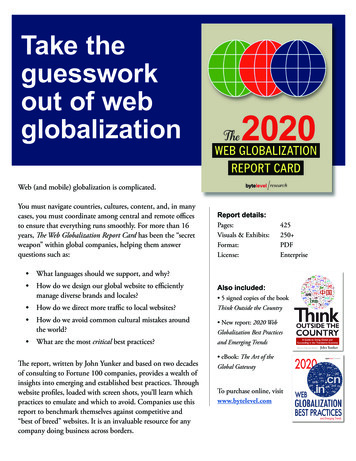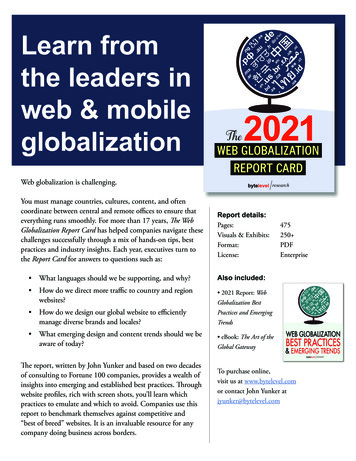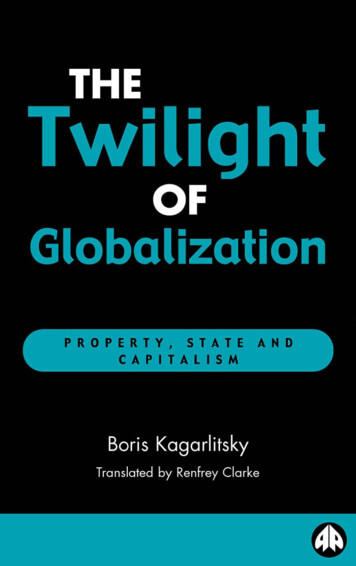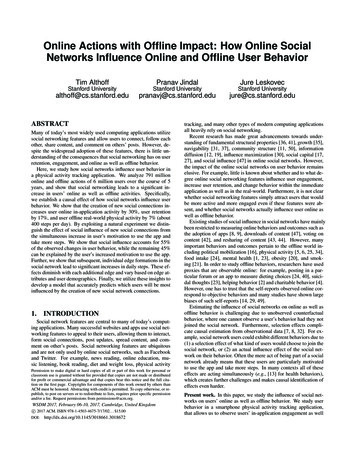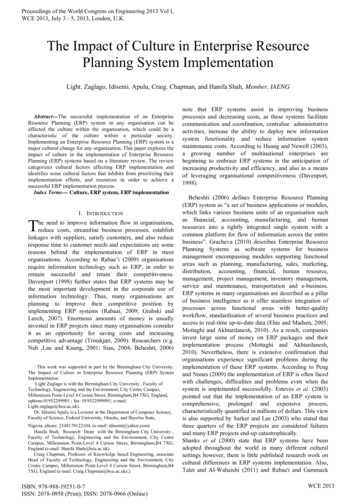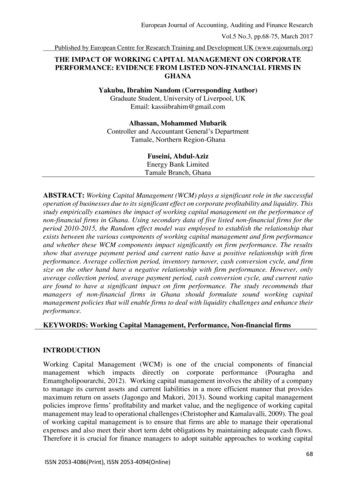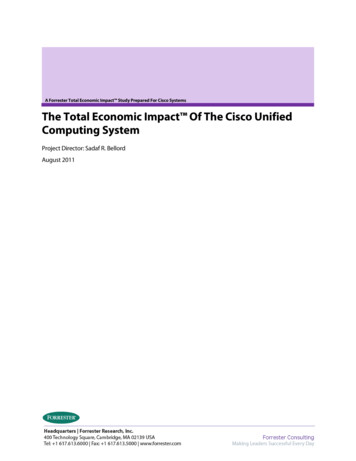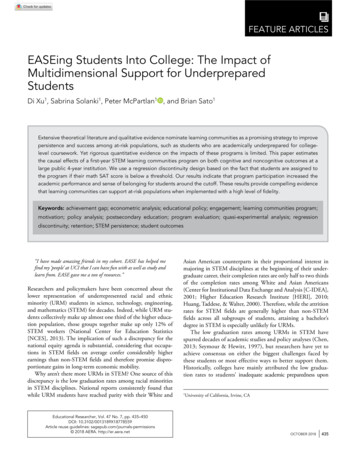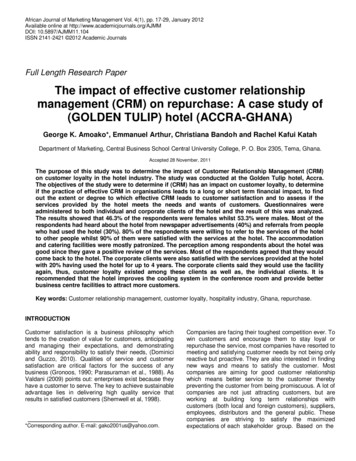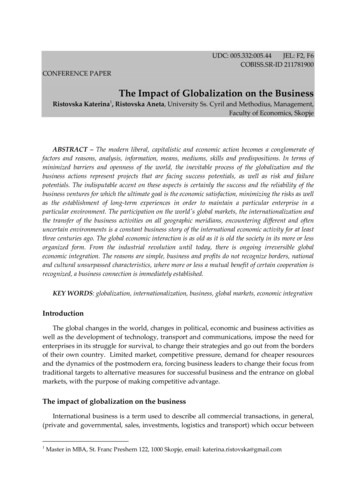
Transcription
UDC: 005.332:005.44JEL: F2, F6COBISS.SR-ID 211781900CONFERENCE PAPERThe Impact of Globalization on the BusinessRistovska Katerina , Ristovska Aneta, University Ss. Cyril and Methodius, Management,Faculty of Economics, Skopje1ABSTRACT – The modern liberal, capitalistic and economic action becomes a conglomerate offactors and reasons, analysis, information, means, mediums, skills and predispositions. In terms ofminimized barriers and openness of the world, the inevitable process of the globalization and thebusiness actions represent projects that are facing success potentials, as well as risk and failurepotentials. The indisputable accent on these aspects is certainly the success and the reliability of thebusiness ventures for which the ultimate goal is the economic satisfaction, minimizing the risks as wellas the establishment of long-term experiences in order to maintain a particular enterprise in aparticular environment. The participation on the world's global markets, the internationalization andthe transfer of the business activities on all geographic meridians, encountering different and oftenuncertain environments is a constant business story of the international economic activity for at leastthree centuries ago. The global economic interaction is as old as it is old the society in its more or lessorganized form. From the industrial revolution until today, there is ongoing irreversible globaleconomic integration. The reasons are simple, business and profits do not recognize borders, nationaland cultural unsurpassed characteristics, where more or less a mutual benefit of certain cooperation isrecognized, a business connection is immediately established.KEY WORDS: globalization, internationalization, business, global markets, economic integrationIntroductionThe global changes in the world, changes in political, economic and business activities aswell as the development of technology, transport and communications, impose the need forenterprises in its struggle for survival, to change their strategies and go out from the bordersof their own country. Limited market, competitive pressure, demand for cheaper resourcesand the dynamics of the postmodern era, forcing business leaders to change their focus fromtraditional targets to alternative measures for successful business and the entrance on globalmarkets, with the purpose of making competitive advantage.The impact of globalization on the businessInternational business is a term used to describe all commercial transactions, in general,(private and governmental, sales, investments, logistics and transport) which occur between1Master in MBA, St. Franc Preshern 122, 1000 Skopje, email: katerina.ristovska@gmail.com
84Economic Analysis (2014, Vol. 47, No. 3-4, 83-89)two or more regions, countries and nations beyond their political borders (Radebaugh &Sullivan, 2007). International business refers to those business activities which include crossborder transactions of goods, services or resources between two or more nations.Transactions of economic resources include capital, skills, people for internationalproduction of physical goods or services, such as finance, banking, insurance, construction(Joshi, 2009). According to Rugman and Collinson, international business analyzestransactions that take place across national borders in order to meet the needs of individualsand organizations. These economic transactions consist of trade (imports and exports) andforeign direct investment (Rugman, Collinson, & Hodgetts, 2006). According to Ball,international business is a business whose activities are carried out beyond the borders oftheir country and here not only include international trade and international production butgrowing service trade in areas such as transport, tourism, advertising, construction, retailand mass communication (Ball, McCulloch Jr., Frantz, Geringer, & Minor, 2002).The companies that are active in international business are called multinationalenterprises. Multinational enterprise is an enterprise or corporation that owns substantialresources and performs various business activities through a network of branches located indifferent countries and each branch form its business strategy, based on the different marketcharacteristics (Cavusgil, Knight, & Riesenberger, 2008). Multinational company is based inone country but has business activities in several countries. There are opinions that themultinational company is one that is so structured that conducts business or property held inmany countries or a company is organized into global production parts.The reasons why a company becomes a multinational, Ansoff separates the twocategories (Ansoff, 1984): Operational needs: providing materials, equipment, technology and release ofsurplus production; Strategic needs: ensuring the inviolability of future changes in the externalenvironment, steady growth (maintaining historic patterns of growth, avoidingstagnation caused by saturation, increasing the volume of business, increasing therate of growth) and better profitability.The development of international business activities coincided with widespreadphenomenon of globalization of markets (Cavusgil, Knight, & Riesenberger, 2008). Theglobalization of markets refers to the growing economic integration and the growinginterdependence of countries worldwide. Internationalization of the companies refers to thetendesncy of the companies to systematically increase the international scope of theirbusiness activities, while globalization refers to a makrotrend intensive economic relationsbetween the countries in the world. Globalization encourages companies to internationalizeand to substantially increase the volume and types of cross-border transactions in goods,services and capital. Also, the globalization leads to rapid dissemination and diffusion ofproducts, technology and knowledge in the world, regardless of the origin.The process of globalization is a natural process that is a result of the growing andaccelerated process of generalizing of the character and process of production. Thedevelopment of science, engineering and technology and the expansion of markets forgoods, worldwide, lead to internationalization of economic and financial developments andtheir global deployment. If globalization is understood as a process that leads to greater
Ristovska, K., et al., The Impact of Globalization, EA (2014, Vol. 47, No. 3-4, 83-89)85economic integration of national economies, as a process of fragmentation of the worldeconomy and the international economy, than the globalization is a process of opening ofnational economies through the removal of economic and financial boundaries of nationaleconomies and thus their transformation into an international economic and financial market(Jovanovski, 2007).Globalization is a worldwide trend, through which economies in the world lose theirborders and connect to each other. The companies are no longer imprisoned in their bordersand can implement a wide range of business activities around the world. Many companiesare present in markets around the world, procured their raw produce or conduct researchand development worldwide. Trade barriers fall and global trade between countries ingoods and services is growing faster than domestic production. As a result of this, companiescan not afford the luxury to assume that the success of the domestic market will lead to longterm profitability (Cullen & Parboteeah, 2010). The flow of money across national borders isfreer, and companies seek better financing rates in the world and investors everywhere arelooking for a more favorable return on investment.Globalization, developed from economic aspect, has two main components: theglobalization of markets and globalization of production. The globalization of markets refersto the merging of historically different and separate national markets into one big globalmarket. In recent years, constantly is discussed that the tastes and preferences of consumersin different countries and nations begin to resemble on a global level and the way that theyhelp in the creating of a global market. The companies that offer standardized productsworldwide, help in the creation of a global market. The most common global markets are notthe markets for mass consumer products, because there are still differences betweencountries in terms of tastes and preferences, which still have great meaning and a sort ofbrake on globalization, but these are the markets for industrial goods and materials that haveuniversal need the world. The globalization of production refers to the tendency of thecompanies to find suppliers of goods and services from locations around the world, in orderto realize the advantage of national differences in price and quality of the factors ofproduction. Companies do this in order to reduce overall costs and thereby to improve thequality or to improve the functionality of their product offering to compete moreeffectively(Hill, 2008).In economics, internationalization is seen as a process of increased involvement ofenterprises in international markets (Susman, 2007). The process of globalization, the fightfor survival, constant pressure and the need to preserve and strengthen the market position,force the companies to be willing to constantly innovate and explore opportunities forachieving competitive advantage and expanding business activities outside the domesticmarket.Entrance of the companies in the global market becomes inevitable not only because oflimitation of the domestic market but also because of the globalization; the domestic marketshare is under threat from foreign competition (Bartels, Buckley, & Mariano, 2009). There areseveral specific factors that promote globalization and guide enterprises to strive for businessdevelopment and growth through the international and global operations and include:political changes, development of technology, international business climate, marketdevelopment, expenses and competition (Ball, McCulloch, Geringer, Minor, & McNett, 2001).
86Economic Analysis (2014, Vol. 47, No. 3-4, 83-89) Political changes. The globalization trend of unifying and socializing the globalcommunity, as well as, forming preferential trade agreements and groupings such asNAFTA and the European Union, which united more nations in a single market, allow thecompanies significant market opportunities. Two aspects of this trend, which contribute tothe globalization of business operations are: progressive reduction of barriers for trade andforeign investment by most governments, which leads to intense opening new markets byinternational companies, which also exported them and build production facilities in them,and the privatization of most of the industry in the former communist countries, as well asopening up their economies to global competition. Development of technology. The development of computing and communicationtechnologies has enabled increased flow of ideas and information across the borders of thecountries, providing introduction of the consumers with the goods worldwide. Internet andnetworking have enabled smaller companies to compete globally, as a result of the rapidflow of information, regardless of the physical location of the seller or buyer. Also, allowsinternational companies to hold corporate meetings among managers from headquarters andbranches, without wasting unnecessary time for travel. International business climate. The development of communication and informationtechnologies have contributed to the process of globalization, but also provided instrumentsthat facilitated the processes of globalization. Newly emerging markets also recognize theeconomic benefits, technological development and growth opportunities that globalizationprovides them. Development of markets. Information and communication technologies, the rapiddevelopment of international tourism, widespread cultural exchange and improved theliving standards, in many developing countries have contributed to the emergence of agroup of consumers in different countries and regions of the world with similar educationalprofiles, lifestyle, purchasing power and for good products, as well as, aspirations for highquality. This scenario, in combination with the liberalization of international trade and theavailability of global distribution channels, opens great opportunities for companies thatwant to offer their products to global markets. Large market potential exist outside of thedomestic market, that is why the companies go out on the foreign markets, generate salesand have opportunities for profit that cannot be achieved at home. Expenses. The liberalization of trade and investment flows, which emerged in the 80sof the last century, which inexorably moved forward, is a stimulus for globalization of thebusinesses. Trade liberalization, global consumer habits, rising development costs and theneed for economies of scale, pressure from foreign competitors in the domestic market aswell as the development of information and communication technologies, are considereddrivers of the globalization. Because of the need to introduce new products and investmentin research, development and innovation, achieving economies of scale, reduce costs andaccess to cheaper raw materials; companies are forced to plan activities, taking intoconsideration the global market. Economies of scale and cost reduction are the main goal ofmanagement. That is why companies decide to locate production in countries where the costof developing and producing are smaller. Competition. One of the reasons that the companies join global strategies is the need ofmaintaining or gaining a competitive advantage in foreign markets and avoiding
Ristovska, K., et al., The Impact of Globalization, EA (2014, Vol. 47, No. 3-4, 83-89)87competition in the domestic market. Competition in international markets is huge andgrowing, with more multinational compe
The impact of globalization on the business International business is a term used to describe all commercial transactions, in general, (private and governmental, sales, investments, logistics and transport) which occur between 1 Master in MBA, St. Franc Preshern 122, 1000 Skopje, email: katerina.ristovska@gmail.com. Economic Analysis (2014, Vol. 47, No. 3-4, 83-89) 84 two or more
